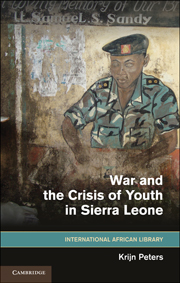Book contents
- Frontmatter
- Contents
- Acknowledgements
- Abbreviations
- Introduction
- 1 Voices from the Battlefield: Ex-Combatants' Views on Root Causes of the War and Their Reasons for Participation
- 2 The Socio-Economic Crisis of Rural Youth
- 3 Conflict in Sierra Leone and Recruits to the War
- 4 The World of the RUF
- 5 Malfunctions and Atrocities
- 6 Cultivating Peace: RUF Ex-Combatants' Involvement in Post-War Agricultural Projects
- 7 Footpaths to Reintegration? Agrarian Solutions for the Reintegration of Ex-Combatants
- 8 Conclusion: The RUF as a Rural Underclass Project
- Epilogue
- Annex I A Chronology
- Annex II Overview: Interviewed Ex-RUF Combatants
- References
- Index
- THE INTERNATIONAL AFRICAN LIBRARY
8 - Conclusion: The RUF as a Rural Underclass Project
Published online by Cambridge University Press: 03 May 2011
- Frontmatter
- Contents
- Acknowledgements
- Abbreviations
- Introduction
- 1 Voices from the Battlefield: Ex-Combatants' Views on Root Causes of the War and Their Reasons for Participation
- 2 The Socio-Economic Crisis of Rural Youth
- 3 Conflict in Sierra Leone and Recruits to the War
- 4 The World of the RUF
- 5 Malfunctions and Atrocities
- 6 Cultivating Peace: RUF Ex-Combatants' Involvement in Post-War Agricultural Projects
- 7 Footpaths to Reintegration? Agrarian Solutions for the Reintegration of Ex-Combatants
- 8 Conclusion: The RUF as a Rural Underclass Project
- Epilogue
- Annex I A Chronology
- Annex II Overview: Interviewed Ex-RUF Combatants
- References
- Index
- THE INTERNATIONAL AFRICAN LIBRARY
Summary
Introduction
This chapter aims to answer three questions.
The first is: How far can we assume the RUF was a product of a pre-determined culture of violence – an intrinsic African barbarism, or violence inherent in the street culture of an urban underclass? The question was first posed by the American journalist Robert Kaplan, but further espoused (in the street culture variant) by a group of Sierra Leonean (diaspora) intellectuals.
A second question is: Was the RUF (secretly?) mainly motivated by greed, not grievance – that is, by attempts to control the rich diamond fields of eastern and southern Sierra Leone? But RUF cadres cited in this book – and some fighters opposed to the RUF – deny diamonds were a major motivation for rebellion. If this is indeed so, we have to answer a derivative question: why did the RUF focus so much attention (latterly) on attempts to control these lucrative diamond areas?
The third and final question is about the RUF as a social organisation: Why did a movement like the RUF increase in numbers so quickly, and how, despite its violent recruitment methods, was it able to retain the attention of a significant proportion of the rural youth it recruited? We will try to assess the merits of the argument that the rapid growth of the RUF was somehow connected to the collapse of a system of patrimonial rule previously ensuring inter-generational social reproduction.
- Type
- Chapter
- Information
- War and the Crisis of Youth in Sierra Leone , pp. 212 - 242Publisher: Cambridge University PressPrint publication year: 2011



